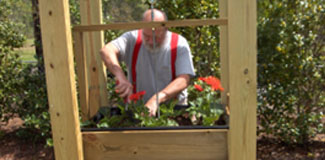THE VARIABLE LEVEL CONTAINER GARDEN
“GROWING ABOVE THE FRAY”
As previously stated, there are three methods to grow a garden, (1) traditional gardening, (2) raised gardening and (3) and container gardening. These three methods have their advantages and disadvantages.
One year ago, I was asked to give a presentation to a group of former patients that had undergone hip and knee replacements.
The idea was to assist them and others that had physical disabilities to enjoy gardening without the associated physical stresses. Traditional gardening and container gardening was out of the picture. Both of these gardening methods require a lot of bending and lifting. Raised gardening was more suitable, however, those patients confined to a wheel chair or walker were at a disadvantage. There must be a better way, a way known as adaptive gardening.
I had been thinking about a way that a person in a wheel chair
could ease up to a container, push a button, the container would rise from the ground and the wheel chair could be maneuvered placing the legs and knees beneath the container. Containers positioned on table tops would accomplish this, but could not be lowered or moved. One night about 3:00 in the morning, I awoke, thinking about this new method of growing, and it dawned on me that an electric hoist could be employed over the container to raise and lower it. The problem was, how do you fasten a cable to a container? Then I remembered that my grandfather had a wooden tool box with a horizontal wooden handle attached to 2 vertical wooden pieces attached to 2 sides of the wooden box. A cable could be attached to the center of the horizontal handle to raise and lower the container to the desired level.
The following image is the first variable level container garden.
The preceding was a beginning of the variable level container garden. The gardener in the pictures is Ed Wagner, a friend of mine who has had both knees operated on for knee replacements.
Next month, you will be reading about the beautiful and mouthwatering tomatoes that were grown. Happy Gardening! Professor Ron.





